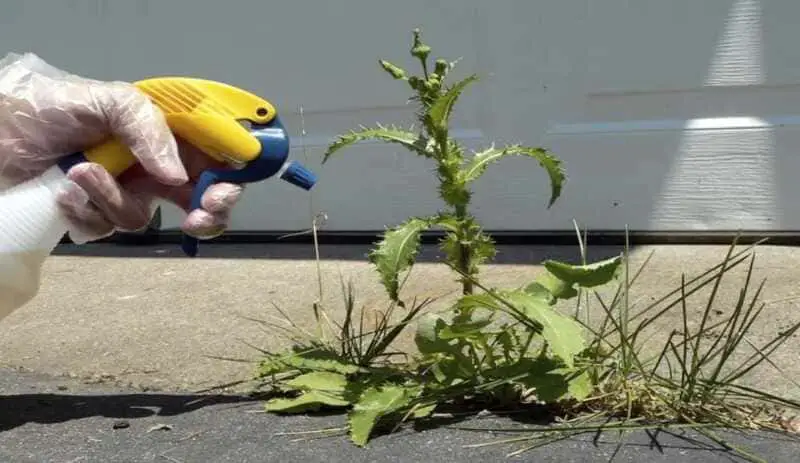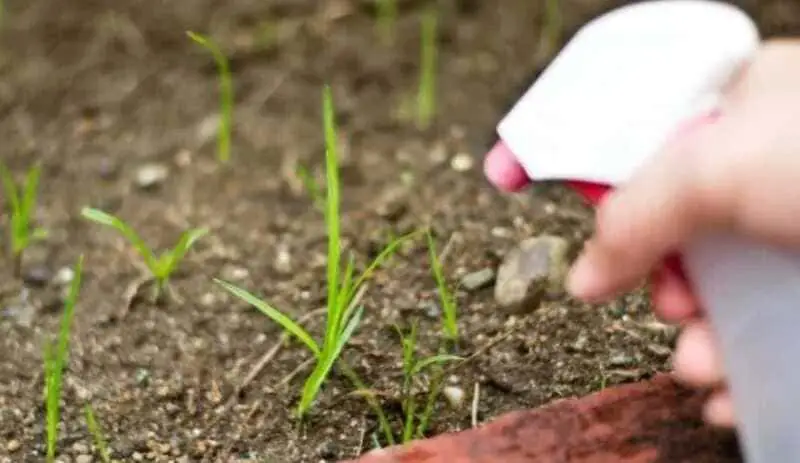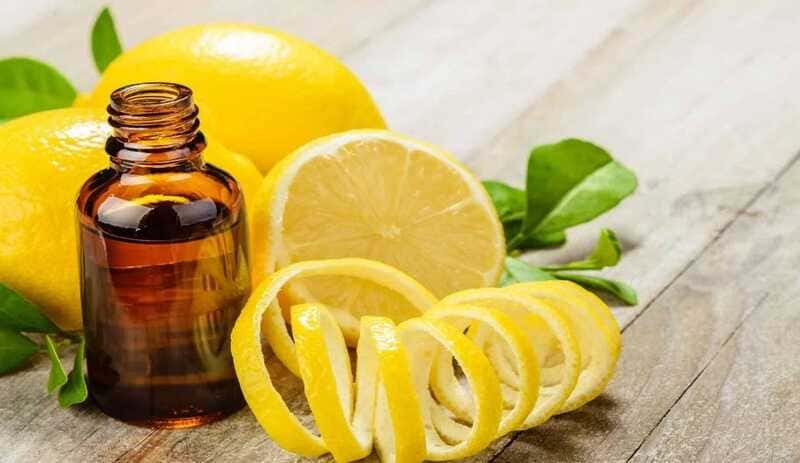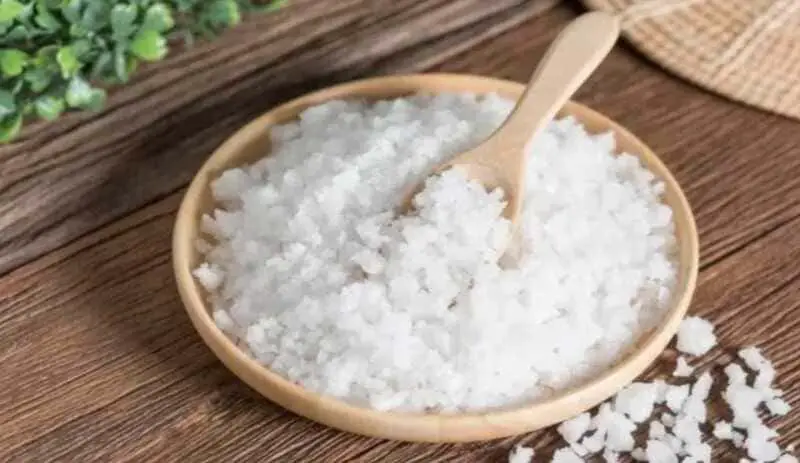Gardening is a rewarding activity, but maintaining a healthy weed-free garden can be a constant challenge. Commercial herbicides can be effective, but they can be expensive and contain chemicals that are harmful to the environment and human health.
Luckily, natural and inexpensive alternatives exist in the form of homemade weed killers. In this article, we’ll explore 8 homemade weed killers that really work, using common ingredients you can find in your home or garden.

You will discover how to apply these remedies effectively, as well as the dangers and precautions to be aware of when using homemade weed killers. We’ll also discuss the advantages and disadvantages of homemade herbicides versus commercial herbicides, and explore other alternatives for maintaining a healthy, weed-free garden.
If you are interested in controlling your weeds naturally and sustainably, read on!
What are home weed killers?
Homemade herbicides are natural mixtures used to kill weeds and other unwanted plants in the garden. Unlike commercial weed killers, which often contain toxic chemicals, homemade weed killers are made from natural ingredients and do not harm the environment or human health.
These homemade herbicides can be made at home using common ingredients such as vinegar, salt, soap, essential oils and other organic materials. In addition to being safer and cheaper than commercial herbicides, homemade herbicides are an excellent choice for gardeners who want to minimize their impact on the environment and keep their gardens free of synthetic chemicals.
Why consider homemade herbicides?
Before defining the 8 homemade herbicides that really work, it is prudent to check out the reasons why gardeners may want to consider using homemade herbicides instead of commercial ones.

First, homemade weed killers are often less expensive than commercial products, as many of the ingredients can be found in most homes. In addition, they are often safer for the environment and human health, as they are made from natural ingredients rather than synthetic chemicals.
Another important reason to consider using homemade herbicides is that many commercial herbicides can have unwanted side effects in the garden, such as killing beneficial plants or contaminating soil and water. Homemade herbicides are a safer, gentler alternative that can kill weeds without damaging other garden elements.
In addition, some gardeners prefer to use homemade herbicides because it allows them to have greater control over the ingredients used in their gardens and reduce exposure to synthetic chemicals. In summary, using homemade herbicides is a safe, effective and economical option for those looking for a more natural alternative to commercial herbicides.
Common ingredients for homemade herbicides.
Common ingredients used to make homemade weed killers include common products that can be found in most homes. White vinegar, for example, is a popular ingredient for home weed killers because it contains acetic acid, which can burn weed leaves and kill weeds. Baking soda is also a common ingredient that can be used to make an effective homemade weed killer, as it helps dehydrate weed leaves.
In addition, lemon or orange essential oil, liquid soap, isopropyl alcohol and salt are other ingredients that can be found in many homemade weed killer recipes. For example, liquid soap is often used to help herbicide ingredients adhere to weed leaves, while salt can help dehydrate plants.

Common ingredients for homemade herbicides are often natural and non-toxic, making them a safe alternative to commercial herbicides. They are also easy to obtain and mix, making them a convenient option for those looking for a more natural weed control solution for their gardens. However, it is important to note that while they are safe for the environment, they can be harmful to beneficial plants if used in excess.
Advantages and disadvantages of homemade herbicides compared to commercial herbicides.
Homemade herbicides can be an alternative to commercial products to control weeds and unwanted growth in the garden or orchard. In order to make the 8 homemade weed killers that really work, it is necessary to check the advantages and disadvantages of homemade weed killers versus commercial products. A key advantage of homemade weed killers is that they are often less expensive than commercial products, and the ingredients needed to make them are common and readily available in most grocery or garden stores.
In addition, homemade herbicides can be less harmful to the environment than commercial products, which often contain toxic chemicals that can contaminate soil and water sources. Homemade herbicides may also be safer for people and pets that may come in contact with them.
However, a disadvantage of homemade herbicides is that they may not be as effective as commercial products in controlling certain weeds and plants. Homemade herbicides may take longer to kill weeds, and multiple applications may be necessary to get the desired results. In addition, homemade herbicides may not be as precise in their targeting as commercial products, which can result in accidental removal of desired plants.
In general, homemade herbicides may be a good option for those seeking cheaper and safer alternatives to commercial products, but it is important to remember that they may have limitations in their effectiveness and accuracy.
Eight recipes for effective homemade weed killers for different types of weeds.
Here is the recipe for 8 homemade weed killers that really work, and can help you control different types of weeds in your garden or orchard:
1- Vinegar and salt weed killer: mix 1 gallon of white vinegar with 1 cup of salt and 1 tablespoon of liquid soap. Shake the mixture well and apply it on the weeds on a sunny and dry day.
2- Baking soda weed killer: mix 1 cup of baking soda with 1 tablespoon of liquid soap and add enough water to make a paste. Apply the paste on the leaves of the weeds.
3- Citric acid herbicide: mix 1 cup of citric acid with 1 gallon of hot water and shake well. Apply the mixture on weeds on a sunny, dry day.
4- Herbal weed killer: mix 1 gallon of white vinegar with 1 cup of fresh herbs such as mint, thyme or rosemary. Let the mixture stand for a few days and then apply it to the weeds.
5- Alcohol weed killer: mix 1 cup of alcohol with 1 liter of water and add a few drops of liquid soap. Apply the mixture on the leaves of the weeds.
6- Neem oil herbicide: mix 1 tablespoon of neem oil with 1 gallon of water and shake well. Apply the mixture on weeds on a sunny, dry day.
7- Epsom salt weed killer: mix 1 cup of Epsom salt with 1 gallon of white vinegar and add a few drops of liquid soap. Apply the mixture on the leaves of the weeds.

8- Boiling water weed killer: boil water in a pot and pour it over the weeds. Be careful not to burn yourself and not to apply boiling water near the plants you want to keep.
It is important to keep in mind that although these homemade herbicides can be effective, it is important to use them with caution and following proper instructions to avoid damaging desired plants and crops.
